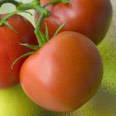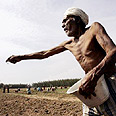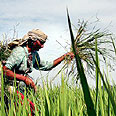


INDIA – A new Indo-Israeli center of agricultural excellence was inaugurated Monday in Haryana state, north of the Indian capital of Delhi.
Some 3,000 farmers from Haryana attended the ceremony, along with Indian Agriculture Minister Sharad Pawar, Haryana Governor Bhupinder Singh and Israel's Ambassador to India Mark Sofer.
The initiative is part of a series of agricultural projects across India, which were launched following an agricultural cooperation agreement signed between Israel and India in 2007.
According to the agreement, Israel will supply the knowledge and India will finance the projects that will help rural farmers make the transition into modern agriculture.
'Humanitarian goal'
The phenomenon of suicide has become increasingly common among Indian farmers, who live in extremely dire conditions.
The project in Haryana aims to increase the quantity of crops, with the hopes that it would help farmers earn a decent living from relatively small plots of land, ranging between 10 and 20 dunams.
A total of six agricultural centers are slated to be built across the country, and the Indian government pledged to invest a minimum of $1 million in each, for a period of three years.
"Our primary goal is humanitarian," said Agricultural Attaché at the Israeli Embassy in Delhi, Dr. Avri Bar Zur.
"There are diplomatic and economic interests as well, and a desire to strengthen the agricultural trade between the countries" he noted, but stressed that "first of all, our mission is to help Indian farmers out of their difficult situation.
"These are simple and hardworking people, and we want to help them make an honest living. We are acting out of genuine respect for what is already on the ground and the rural Indian culture," he added.
In addition to financing the project, the Indian government also selects the farmers that will participate in the program and is responsible for sponsoring 80% of the cost of equipment the farmers purchase after they undergo the training.
"Naturally, much of this equipment – which includes greenhouses, hoses, and irrigation systems – is produced by Israeli companies that are represented in India in various ways," noted Bar Zur.
Smooth cooperation
The agricultural attaché estimated that the purchase of Israeli equipment by Indian farmers will reach tens of millions of dollars over the next few years.
Bar Zur noted that at the moment, living conditions in rural farms are not suitable for the permanent residence of Israeli instructors. Therefore, the teachers and instructors – all Israelis – will not reside in India, but will instead make short trips back and forth.
During the inauguration ceremony of the center, the Indian agricultural minister spoke of continuing the cooperation between the two countries in order to improve Indian agriculture.
"It should not be taken for granted," noted Ben Zur, "India does not consider itself a third world country that is in need of aid, and has a deep sense of pride," he added.
Head of the excellence center at the Indian Agriculture Ministry Dr. Arjun Saini described the smooth cooperation with the Israelis.
"I visited Israel four times and received the impression that (Israel) is more developed in a number of fields, especially in everything that has to do with the correct use of water.
"We are both English-speaking countries, so that communicating is easy. I find that Israelis become easily compatible to other peoples and cultures," he added.
- Follow Ynetnews on Facebook















